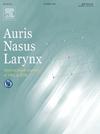Effect of acute ethanol intoxication on swallowing function in mice
IF 1.6
4区 医学
Q2 OTORHINOLARYNGOLOGY
引用次数: 0
Abstract
Objectives
Ethanol consumption may lead to various symptoms depending on its concentration in the blood. Acute ethanol intoxication is a major risk factor for bolus -aspiration; however, studies on the effects of acute ethanol intoxication on swallowing are lacking. Therefore, we investigated the effect of acute ethanol intoxication on mice using the videofluoroscopic swallowing study (VFSS) methodology.
Methods
Male C57BL/6 J mice were randomly allocated into three groups: saline injection, 2 g/kg ethanol injection, and 4 g/kg ethanol injection. The VFSS technique was used to analyze the inter-swallow interval, lick-swallow rate, lick rate, bolus area, pharyngeal transit time, bolus speed, and bolus area 3 d before injection (control), 2 h after injection, and 8 h after injection.
Results
In the 4 g/kg ethanol injection group, the inter-swallow interval and lick-swallow rate increased after 2 h However, these changes were reversed 8 h after ethanol administration. Additionally, the pharyngeal transit time, bolus speed, and bolus area did not change significantly after ethanol administration.
Conclusions
The present study reveals that ethanol administration delays bolus transport in the mouth but does not affect pharyngeal swallowing reflexes and reflex thresholds. Acute ethanol intoxication specifically impairs the oral function as assessed by the VFSS.
求助全文
约1分钟内获得全文
求助全文
来源期刊

Auris Nasus Larynx
医学-耳鼻喉科学
CiteScore
3.40
自引率
5.90%
发文量
169
审稿时长
30 days
期刊介绍:
The international journal Auris Nasus Larynx provides the opportunity for rapid, carefully reviewed publications concerning the fundamental and clinical aspects of otorhinolaryngology and related fields. This includes otology, neurotology, bronchoesophagology, laryngology, rhinology, allergology, head and neck medicine and oncologic surgery, maxillofacial and plastic surgery, audiology, speech science.
Original papers, short communications and original case reports can be submitted. Reviews on recent developments are invited regularly and Letters to the Editor commenting on papers or any aspect of Auris Nasus Larynx are welcomed.
Founded in 1973 and previously published by the Society for Promotion of International Otorhinolaryngology, the journal is now the official English-language journal of the Oto-Rhino-Laryngological Society of Japan, Inc. The aim of its new international Editorial Board is to make Auris Nasus Larynx an international forum for high quality research and clinical sciences.
 求助内容:
求助内容: 应助结果提醒方式:
应助结果提醒方式:


